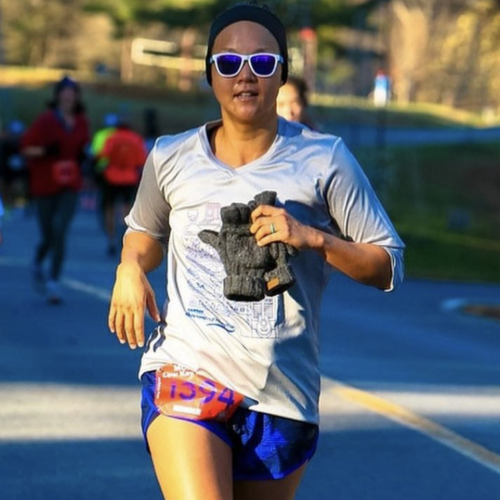Submit your story here.
Discovering the Path: Alison O’Brien’s Endurance Journey

-
NB SC trainer (V1)
-
Goodr sunglasses, aviator style
-
Oiselle pocket jogger shorts
Sometimes it’s the unexpected encounters that spark transformations. Alison O’Brien discovered the path into running was started by a coworker whose dedication to fitness stood out amidst the late nights and revelry of the restaurant industry. “I met a co-worker, and he was kind of like the first obsessed runner that I had ever met,” Alison reminisces. “He didn’t drink, he didn’t smoke. He was running long distances all the time.”
That encounter, coupled with a running book titled Slow Burn by Stu Middleman, laid the foundation for Alison’s foray into running. In a world before everything at your fingertips, the book served as her guiding light. The book advocated the virtues of slow, methodical progress. “It was all about zone two running before zone two running was a thing,” she recalls with a chuckle. With determination fueled by curiosity and a desire for change, Alison started on her running journey, taking it one day at a time.
Navigating the Challenges
Alison’s initial steps weren’t a seamless transition. Battling against the grip of a smoking habit and the chaos of a demanding lifestyle, she found purpose in putting one foot in front of the other. “I was really unhealthy at that point,” she admits. “I realized I can’t keep up with this lifestyle for much longer.” Running became her anchor, offering respite from the tumult of life’s challenges.
However, the journey wasn’t without its obstacles. Alison’s struggle with alcohol consumption added another layer of complexity to her path. “Alcohol was something I had a problem with for a long time,” she shares. It wasn’t until the upheaval of the pandemic that she confronted her relationship with alcohol. A new journey would start where sobriety intertwined with her passion for running. “For better or worse I sort of replaced alcohol with running. I was developing an unhealthy relationship with running in that first year of sobriety” she reflects.
Transformation through Physical Activity
For Alison, running is more than physical exertion; it became a vehicle for discovering the path to personal growth and resilience. As she navigated the trials of motherhood and the demands of daily life, running provided a sanctuary—a space to reclaim her identity and prioritize self-care. “Running and parenting definitely go hand in hand for me,” she affirms. “Running kind of saved me from just the stress of those times when your kids are small and can be really dark and lonely.”
Despite the allure of setting ambitious goals and chasing personal bests, Alison emphasizes the importance of embracing the journey itself. “I think anything is enough,” she advises aspiring athletes. “If you only have time to do a mile, then go do a mile. It’ll get easier, and you’ll have more time eventually.”
ADVERTISEMENT

Running as a Tool, Not a Replacement for Therapy
Alison’s journey with running has been transformative, providing her with a sense of purpose and empowerment. “Running has been my lifeline during tough times,” she shares. “It’s given me a way to channel my energy and emotions, helping me to navigate through life’s challenges.” For Alison, hitting the pavement isn’t just about physical fitness; it’s a form of self-care and resilience.
However, Alison is quick to emphasize that running is not a substitute for therapy. “While running has been incredibly beneficial for my mental health, it’s important to recognize its limitations,” she reflects. “There are aspects of my mental well-being that running alone cannot address. Therapy and support groups were vital to my health when I first got sober, they taught me how to use running as a tool for managing my mental health, instead of as a way to escape.” Alison’s experience underscores the importance of viewing running as a part of a holistic approach to mental health care.
Embracing Acceptance
Through the highs and lows of her endurance journey, Alison discovered the path to acceptance—both of herself and her body. “I eventually accepted that my body just kind of wants to be a certain weight,” she reflects. “I do feel like there’s an equilibrium.”
Embracing this realization, Alison found liberation from the societal pressures of achieving a predetermined ideal. “Just keep doing what I’m doing because I feel healthy,” she asserts. “If you’re healthy and you’re strong, then you’re robust. That’s really all you’re looking for.”
A Journey Unveiled
Alison O’Brien’s participation in endurance sports is an example for many. From a beginning sparked by a chance encounter to the profound lessons learned through overcoming adversity, her story resonates with authenticity and resilience. Through running, Alison found not only physical strength but also mental fortitude and emotional healing.
As she continues to navigate life’s twists and turns, Alison remains steadfast in her commitment to embracing the journey, celebrating victories—both big and small—and prioritizing self-care above all else. For those embarking on their own endurance journey, Alison’s words offer sage advice: “Do what you can. Don’t stress about anything else. Just keep going.”
If you are getting started and uncertain of where the path may lead you, don’t be alarmed. Alison’s story shines a light on the power of perseverance, reminding us that the journey itself is the ultimate destination.
ADVERTISEMENT








